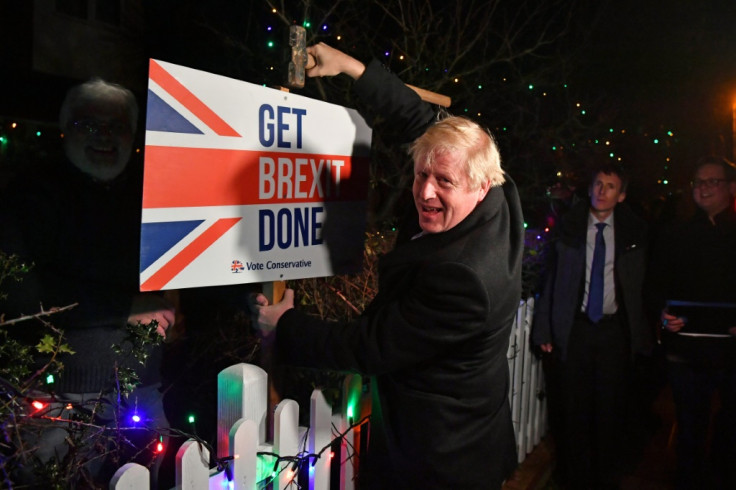Boris Johnson vows to get Brexit done after sweeping election win
He will be able to get the divorce deal he struck with Brussels through parliament in time to meet the January 31 deadline.
Prime Minister Boris Johnson on Friday hailed a political "earthquake" in Britain after a thumping election victory which clears the way for the country to finally leave the EU next month after years of paralysing deadlock.
With all but one result declared for the 650-seat parliament, Johnson's Conservative party has secured 364 seats -- its biggest majority since the heyday of Margaret Thatcher in the 1980s.
Condemning more than three years of political wrangling over Brexit, Johnson vowed in his victory speech on Friday to "put an end to all that nonsense" and "get Brexit done on time by January 31, no ifs, no buts".
By contrast the main opposition Labour party suffered its worst electoral performance since before World War II, forcing leader Jeremy Corbyn to announce plans for his departure.
Sterling jumped overnight to its highest level since mid-2018 on hopes that Johnson will deliver his promise to "Get Brexit Done" after years of uncertainty and deep divisions over Britain's future.
Early Friday it had pulled back a little to trade at $1.3403.
With such a large majority of MPs, Johnson will be able to get the divorce deal he struck with Brussels through parliament in time to meet the January 31 deadline.
Ratifying the deal would formalise the end of almost five decades of EU-UK integration, although both sides still need to thrash out a new trade and security agreement.
EU Council President Charles Michel said the bloc was set for talks but would do its utmost to protect European priorities.
"My point is very clear: we are ready. We have decided what are our priorities," Michel said as he arrived at an EU summit where leaders would discuss the aftermath of the UK vote.
The result of Thursday's election -- the third in almost five years -- signals a personal victory for Johnson, a former London mayor and foreign minister who helped lead the Brexit campaign to victory in the 2016 EU referendum.
US President Donald Trump tweeted his congratulations on a "great WIN!" and said London and Washington would be able to strike a "massive new trade deal" after Brexit.
"This deal has the potential to be far bigger and more lucrative than any deal that could be made with the E.U. Celebrate Boris!" he said.
The Conservatives had been ahead in opinion polls for weeks but the scale of their victory, after a wet and windy pre-Christmas election, was unexpected.
"We must understand now what an earthquake we have created," Johnson later told party staff, according to the Press Association news agency.
He earlier declared when he was re-elected as an MP that voters had given him "a powerful new mandate to get Brexit done".
Johnson now has up to five years to govern until he is obliged to call another election.
Labour was heading to its worst result since 1935, losing 59 seats to 203, after what Corbyn admitted had been a "very disappointing night".
He said he would be stepping down after a period of "reflection", and would not be leading the party into the next election, which is due by 2024.
Corbyn had promised a second referendum on Brexit in a bid to appeal to half of British voters who still want to stay in the EU.
But he had focused Labour's campaign on a radical programme of economic change, including re-nationalising some key industries, which failed to woo traditional voters.
Speaking in the early hours of Friday, Corbyn defended his "manifesto of hope" and maintained his policies were "extremely popular" during the campaign.
But he said: "Brexit has so polarised and divided debate in this country, it has overridden so much of a normal political debate."
Corbyn is personally unpopular and dogged by accusations of sympathising with proscribed terror groups and failing to tackle anti-Semitism within the Labour party.
This is Labour's fourth successive electoral defeat -- and the second under Corbyn.
The anti-Brexit Liberal Democrats also did poorly and announced they would replace Jo Swinson as leader after she lost her seat in western Scotland to the Scottish National Party (SNP).
The Lib Dems were predicted to win 11 seats, down one on the last election in 2017.
Analysts said Swinson's campaign to reverse Brexit without even a new referendum was unpopular, while efforts to create a "Remain" alliance to stop Brexit failed.
By contrast the Scottish National Party (SNP), which wants to stop Brexit and deliver an independent Scotland, gained 13 seats to reach 48.
Nigel Farage's Brexit Party failed to win any seats, but he claimed to have helped Johnson standing down his own candidates in Tory-held seats.
He has then just 11 months to agree a new partnership with the EU before a post-Brexit transition period ends in December 2020.
But with a comfortable majority in parliament, analysts note he could choose to extend that time and negotiate a closer trade deal than previously envisaged.
"Ironically, this is a freer hand for Johnson to negotiate a softer version of Brexit," said Simon Hix of the London School of Economics.
Copyright AFP. All rights reserved.

This article is copyrighted by International Business Times, the business news leader





















